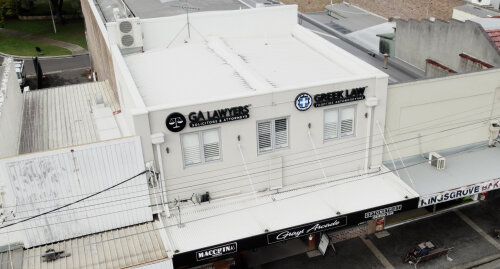Best Property Insurance Lawyers in Australia
Share your needs with us, get contacted by law firms.
Free. Takes 2 min.
Or refine your search by selecting a city:
List of the best lawyers in Australia
About Property Insurance Law in Australia
Property insurance in Australia is designed to protect property owners against financial losses related to damage or loss of their property. Coverage typically includes protection against events such as fire, theft, vandalism, and natural disasters. The insurance landscape in Australia is regulated to ensure fairness and transparency, with entities such as the Australian Securities and Investments Commission (ASIC) overseeing insurance practices. Policies vary widely in terms of premium, coverage, and conditions, making it important for property owners to carefully review their agreements.
Why You May Need a Lawyer
A lawyer specializing in property insurance can be invaluable in multiple situations. Common scenarios requiring legal advice include disputes over claims where the insurer refuses to pay or offers insufficient compensation, understanding the terms and conditions of insurance policies, negotiating settlements, and resolving issues related to denial of coverage. Legal assistance may also be crucial if there is a breach of contract or if the policyholder believes the insurer is acting in bad faith. Lawyers can provide guidance on your rights and obligations, and represent you in court or negotiations.
Local Laws Overview
Property insurance in Australia is governed by several key pieces of legislation that ensure consumer protection and financial market regulation. The primary legislation includes the Insurance Contracts Act 1984, which dictates the standards and practices for insurance contracts. Additionally, the Australian Consumer Law (ACL) provides general consumer protections that apply to insurance policyholders. The industry is also regulated by the Insurance Act 1973 and supervised by the Australian Prudential Regulation Authority (APRA), which ensures companies maintain financial health and adhere to prudence in business operations.
Frequently Asked Questions
What does property insurance typically cover?
Property insurance generally covers loss or damage caused by events like fire, theft, storms, and floods. It often includes building insurance for physical structures and contents insurance for personal belongings within the property.
Is property insurance mandatory in Australia?
While property insurance is not legally required by the government, it is highly recommended. Mortgage lenders often require borrowers to have it as a condition of the loan.
What should I do if my insurance claim is denied?
If your claim is denied, you can request a detailed explanation from your insurer. You may then seek a review through their internal dispute resolution process. If unsatisfied, you may approach the Australian Financial Complaints Authority (AFCA) or consider legal advice.
Can I change my property insurance policy at any time?
You can change your policy or insurer at any time, but it’s important to understand any exit costs or terms that apply. Ensure continuous coverage during transitions.
How are property insurance premiums determined?
Premiums are based on factors including the location and age of the property, construction materials, security features, and the level of coverage chosen.
Are floods covered by standard property insurance policies?
Not all standard policies cover flood damage; coverage for specific natural disasters should be verified in your policy’s terms and conditions.
What is underinsurance, and how can it affect my claim?
Underinsurance occurs when your coverage limit is too low to fully cover a loss. It can result in receiving a lower claim settlement than needed to repair or replace the property.
Are there any laws protecting me against unfair treatment by insurers?
Yes, the Insurance Contracts Act 1984 and the Australian Consumer Law (ACL) provide protections to ensure fair treatment by insurers.
What steps should I take after property damage occurs?
Document the damage with photos and records, take steps to prevent further loss, notify your insurer promptly, and follow their claim process.
Can I dispute my insurance payout amount?
Yes, if you believe your payout is insufficient, you can challenge it through your insurer’s internal dispute process or seek assistance from the AFCA or a lawyer.
Additional Resources
For further assistance, consider reaching out to the following resources:
- Australian Securities and Investments Commission (ASIC)
- Australian Financial Complaints Authority (AFCA)
- Insurance Council of Australia
- Australian Prudential Regulation Authority (APRA)
- Consumer advocacy groups like Choice
Next Steps
If you need legal assistance, start by gathering all relevant documents, such as your insurance policy, communication with the insurer, and any claim-related documentation. Contact a lawyer specializing in property insurance to discuss your situation and explore your legal options. Many law firms offer initial consultations, which can help determine the best course of action according to your specific circumstances.
Lawzana helps you find the best lawyers and law firms in Australia through a curated and pre-screened list of qualified legal professionals. Our platform offers rankings and detailed profiles of attorneys and law firms, allowing you to compare based on practice areas, including Property Insurance, experience, and client feedback.
Each profile includes a description of the firm's areas of practice, client reviews, team members and partners, year of establishment, spoken languages, office locations, contact information, social media presence, and any published articles or resources. Most firms on our platform speak English and are experienced in both local and international legal matters.
Get a quote from top-rated law firms in Australia — quickly, securely, and without unnecessary hassle.
Disclaimer:
The information provided on this page is for general informational purposes only and does not constitute legal advice. While we strive to ensure the accuracy and relevance of the content, legal information may change over time, and interpretations of the law can vary. You should always consult with a qualified legal professional for advice specific to your situation.
We disclaim all liability for actions taken or not taken based on the content of this page. If you believe any information is incorrect or outdated, please contact us, and we will review and update it where appropriate.
Browse property insurance law firms by city in Australia
Refine your search by selecting a city.

















